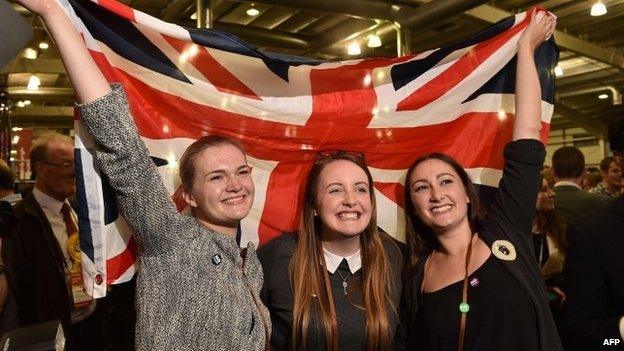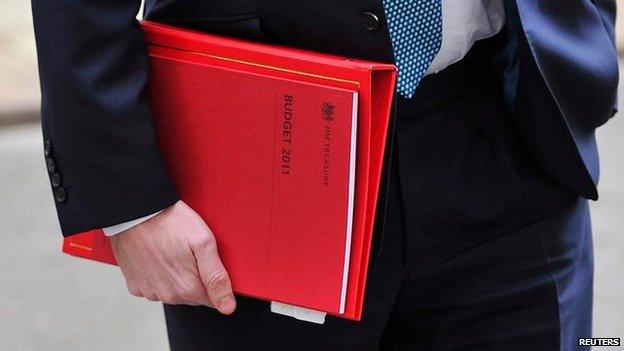Future of News: How do you connect young people with politics?
- Published

The Scottish independence referendum showed young people's interest in political debate
Radio 1's Newsbeat is trying to find new ways to involve young people in areas of news they appear at first glance to have little interest in - areas such as politics.
It's the one piece of feedback I've never forgotten.
It was the first time I'd covered a politics story at Radio 1 Newsbeat and afterwards the programme editor sent me a short message: "Nice try, but when you're writing about politics for our audience it's best not to include the names of any politicians or parties in the top line."
For me, it's a sentiment that best sums up Newsbeat's attitude towards covering politics for our audience of 16-24 year olds.
Of course they're interested in the news, they care passionately about big issues but the moment you mention politicians you're battling to keep their attention.
As Newsbeat's politics reporter I'm continuously speaking to young people across the country about what matters to them. I've listened to them talk at length about their frustration with low pay, lack of jobs, immigration etc.
The problem is the majority of them make no connection between the issues that matter to them and the ability or desire of politicians to affect their lives.
Lack of trust
The moment you drop party policies into the conversation the atmosphere changes and you're often interrupted with the typical reply: "I'm not interested in politics, mate, none of it affects me. They're all the same."
Don't get me wrong, I don't think young people aren't engaged in politics. They are hugely engaged in the issues that affect their lives but they're not engaged in the way politics is traditionally presented to them.
This may only be anecdotal evidence but it's backed up by the 2011 British Social Attitudes study which found only 11% of young people said they had a great deal or a lot of interest in politics, down from 22% in 1991.
Young people are also less likely to be registered to vote and also less likely to participate at elections than older people. According to the Electoral Commission, external it's estimated that only 44% of people aged 18-24 voted in the 2010 general election, compared with 75% of people aged over 55.
It's true that young audiences have always been the least likely to take an interest in political coverage but I think it's also fair to say their enthusiasm has waned even further in the last few years.

A majority of young people say they feel no connection with politics and the way it's presented to them
I think there are two main reasons. Firstly, their declining trust in politicians. The expenses scandal may have happened more than five years ago but it is still frequently mentioned by young people whenever they discuss their feelings about politicians. Many also believe politicians don't speak for them and don't care about the concerns of young people because they don't rely on their vote.
The second reason is down to the changing ways young people are consuming news. The days of being spoon-fed the agendas of radio and TV bulletins are quickly fading and it's much more common for people to customise their diet of news online.
Engaging and shareable
It's now easier for young people to tailor their newsfeeds on social media to reflect their interests. That in turn makes it easier to flush out coverage of things they prefer to ignore - which means Prime Minister's questions or the party conference season don't get a look in.
It's the challenge we've been adapting to at Newsbeat over the past year as we continue to develop our digital strategy. As well as our traditional story-telling on the radio, we've focussed on creating content online that's both engaging and shareable. Whether it's an animation about self-harm treatments, external, a video diary of a teenage cancer patient or a quiz about the Queen's state opening of Parliament, the priority is to find engaging ways to keep informing our audience.
None of this means we stop telling the important, complex political stories. It's still our job to make young people realise things like the Autumn Statement or European elections matter to their lives.
The key for us is to avoid presenting political stories through the prism of Westminster debates or speeches by politicians in front of podiums.
One of our biggest successes in recent months was our coverage of the Scottish Independence Referendum. An hour long debate with 100 young Scots that was simulcast on Radio 1 and the BBC News Channel demonstrated the passion of young people when it comes to politics. The two politicians in the audience - Chief Secretary to the Treasury Danny Alexander and Scottish government minister Humza Yousaf - both struggled at times to get a word in as they were continually fielding intelligent questions.
Afterwards Danny Alexander commented on BBC Five Live that it was the best debate he'd been involved in during the entire campaign.
It demonstrates that young people do care about politics and do care about the effect it has on their lives.
This year our challenge is to keep making it accessible and relevant to them so they feel involved in one of the most exciting elections for years.